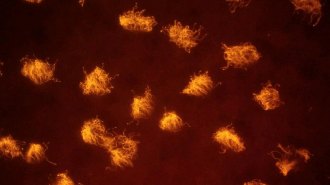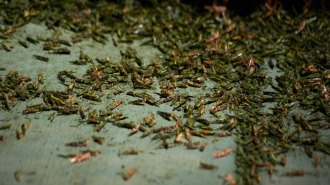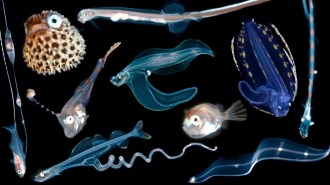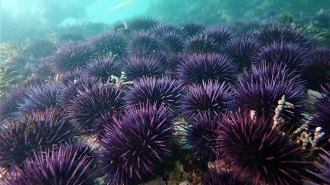All Stories
-
 Planetary Science
Planetary ScienceA meteor may have exploded over Antarctica 430,000 years ago
Tiny spherules recovered from a mountaintop suggest a space rock broke apart midflight and sprayed debris across thousands of kilometers.
By Sid Perkins -
 Health & Medicine
Health & MedicineFrog skin cells turned themselves into living machines
The “xenobots” can swim, navigate tubes, move particles into piles and even heal themselves after injury, a new study reports.
-
 Life
LifeThese are the 5 costliest invasive species, causing billions in damages
Invasive species have cost the global economy at least $1 trillion since 1970 and $162.7 billion in 2017 alone. The annual cost is increasing.
-
 Archaeology
ArchaeologyStone Age culture bloomed inland, not just along Africa’s coasts
Homo sapiens living more than 600 kilometers from the coast around 105,000 years ago collected crystals that may have had ritual meaning.
By Bruce Bower -
 Cosmology
CosmologyPhysicists’ devotion to symmetry has led them astray before
If dark matter WIMPs are mythical, they join the ancient idea that the planets moved in circles.
-
 Animals
AnimalsWeather radar shows 30 metric tons of grasshoppers swarmed Las Vegas one night
Everything’s glitzier in Las Vegas. The most intensely lit U.S. city shows the impact of artificial light on insects on a megascale.
By Susan Milius -
 Health & Medicine
Health & MedicineModerna and Pfizer COVID-19 vaccines may block infection as well as disease
The mRNA vaccines are about 90 percent effective at blocking coronavirus infection, which could lead to reduced transmission, real-world data suggest.
-
 Animals
AnimalsDazzling underwater photos capture new views and scientific detail of fish larvae
Lab specimens of fish larvae are often mangled and bleached. Divers and researchers have partnered to study their rich colors and intricate bodies.
-
 Physics
PhysicsUranium ‘snowflakes’ could set off thermonuclear explosions of dead stars
Uranium crystals that settle in the cores of white dwarfs could trigger nuclear chain reactions that blow the dead stars apart, a new study suggests.
-
 Astronomy
AstronomyHere’s why humans chose particular groups of stars as constellations
Distances between stars, their brightnesses and patterns of human eye movement explain why particular sets of stars tend to be grouped together.
-
 Ecosystems
EcosystemsHow kelp forests off California are responding to an urchin takeover
A pair of studies reports 95 percent loss of kelp forests along the northern coast while sea otters are helping maintain surviving kelp farther south.
-
 Science & Society
Science & SocietyParents in Western countries report the highest levels of burnout
The first survey comparing parental exhaustion across 42 countries links it to a culture of self-reliance.
By Sujata Gupta